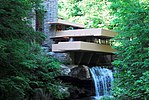Architectural modernism
Top: Villa Savoye by Le Corbusier (1927); TWA Flight Center at JFK Airport by Eero Saarinen (1962): Center: Skyline of Chicago: Bottom: Fallingwater by Frank Lloyd Wright (1935); Sydney Opera House by Jørn Utzon (1973)
|
|||||||
| Years active | 1920-1985 | ||||||
|---|---|---|---|---|---|---|---|
| Country | international | ||||||
Modern architecture or modernist architecture is a term applied to a group of styles of architecture which emerged in the first half of the 20th century and became dominant after World War II. It was based upon new technologies of construction, particularly the use of glass, steel and reinforced concrete; and upon a rejection of the traditional neoclassical architecture and Beaux-Arts styles that were popular in the 19th century.
Modern architecture continued to be the dominant architectural style for institutional and corporate buildings into 1980s, when it was challenged by postmodernism, and then by "neomodernism" and other schools which gradually supplanted it.
Notable architects important to the history and development of the modernist movement include Frank Lloyd Wright, Ludwig Mies van der Rohe, Le Corbusier, Walter Gropius, Konstantin Melnikov, Erich Mendelsohn, Richard Neutra, Louis Sullivan, Gerrit Rietveld, Bruno Taut, Gunnar Asplund, Arne Jacobsen, Oscar Niemeyer and Alvar Aalto.
The Crystal Palace, 1851, was one of the first buildings to have cast plate glass windows supported by a cast-iron frame
...
Wikipedia





